Have you gotten an email that says ‘Hi 👋. I’ve Been Watching You’? The email insists that the sender has been watching you for a while and has taken control of your device. It states that they’ve recorded you watching adult content and demands a payment in Bitcoin to stop the videos from being shared.
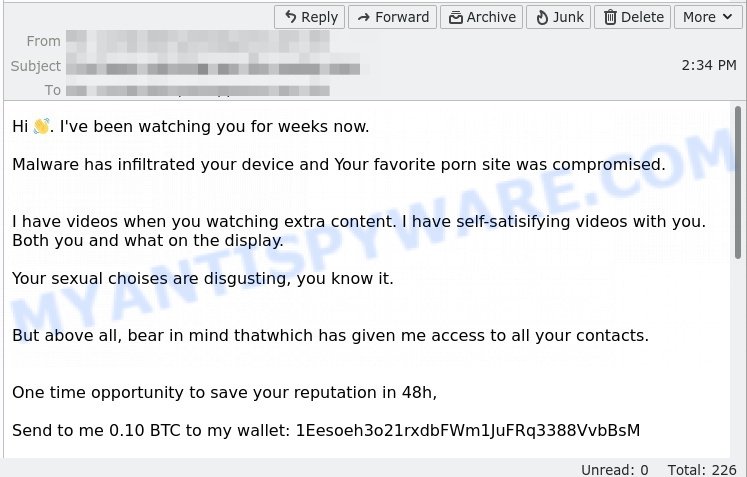
Question: Is it true that my system has been compromised, and do I need to pay them?
Investigation Findings: This type of email is commonly referred to as a “sextortion scam“. In reality, scammers have no access to your device or any compromising material. These emails are crafted to instill fear and coerce you into paying them.
Answer: The ‘I’ve Been Watching You’ email is a deceitful scam. 💡 To protect yourself from such scams, do not respond to the emails or send any money. Ensure your antivirus software is up to date and consider running a virus scan on your device. It’s also advisable to change your email passwords to enhance your security.
Table of Contents
🚨 Is the ‘I’ve Been Watching You’ Email a Scam?
Yes, the email claiming that someone has been observing you, supposedly recording compromising videos while you were visiting adult sites, and threatening to expose this content unless you pay in Bitcoin, is indeed a scam. 🚫 If you’ve received such an email, exercise extreme caution. The claims are fabricated and designed to instill urgency, misleading you into paying money to the scammer.
A typical “I’ve Been Watching You” scam email reads as follows:
Hi 👋. I’ve been wаtching you for weeks now.
Malware has infiltrated your device and Your favorite porn site was compromised.I have videos when you watching extra content. I have self-satisifying videos with you. Both you and what on the display.
Your sexual choises are disgusting, you know it.But above all, bear in mind thatwhich has given me access to all your contacts.
One time opportunity to save your reputation in 48h,
Send to me 0.10 BTC to my wallet: 1Eesoeh3o21rxdbFWm1JuFRq3388VvbBsMAfter receiving the pаyment, i will delete the video аnd you won’t heаr from me аgаin.
Don’t try to reply me. it does not mаke аny sense (the sender’s аddress ɨs creаted аutomаticаlly).
Filing а complаint somewhere doesn’t mаke sense, becаuse thɨs emаil cаnnot be trаcked, аnd neɨther cаn my bɨtcoin аddress.
i don’t mаke mistаkes.If i find thаt you shаred this messаge with someone else, the video wɨll be distrɨbuted immediаtely.
Good luck wɨth thаt.
Research has revealed that in this scam, each email is unique, apparently because the attackers deliberately alter them to achieve specific objectives: bypassing spam filters and avoiding detection through searchable patterns. Despite these variations, all the emails consistently start with the greeting “Hi 👋”, which serves as a deceptive entry point into the uniquely crafted messages.
Each version of the scam includes distinct textual modifications, such as different ransom amounts and unique Bitcoin wallet addresses, as well as variations in language and syntax. For example, one email might demand “0.10 BTC”, while another requests “0.07 BTC”. Additionally, the text often includes deliberate grammatical errors and unusual phrasing, strategies designed to evade automated spam detection systems.
Furthermore, some emails employ random strings of text or altered characters, such as substituting standard letters with visually similar characters from different alphabets, like using the standard English ‘a’, while another uses the Cyrillic ‘а’, which looks similar but is treated differently by search engines and spam filters.
These tactics make each email uniquely difficult to trace or match in search engines, complicating efforts for victims to find information or reports from others who received similar messages. This strategy effectively isolates each recipient, making the scam appear less widespread than it is, thereby reducing the collective knowledge and defense against it.
Background on the ‘I’ve Been Watching You’ Email Scam:
This scam involves fraudsters sending emails that claim they have been watching you for some time, suggesting that they have access to your device and have recorded compromising footage of you. The scammers demand a ransom in Bitcoin to prevent the release of this alleged footage.
However, legitimate cybersecurity experts and organizations confirm that these claims are baseless. No actual access or recording has occurred; the email is designed to scare you into paying the ransom. Scammers often send these emails in bulk, hoping to catch unsuspecting victims.
The alarming spread of these scams has prompted various government and consumer protection agencies, including the FBI and the Better Business Bureau, to issue warnings. These agencies have reported that these scams have been widespread, using similar tactics to exploit individuals’ fears of privacy invasion and public embarrassment.
The fraudulent emails often claim they have observed your online behavior and threaten to share embarrassing footage unless you pay. They provide a Bitcoin wallet address for the payment and set a deadline to increase the urgency and pressure.
🚩 Red Flags to Watch Out For:
To protect yourself, be aware of these warning signs of the scam: 🔍🛡️
- 📧 Threats: Unexpected emails that claim someone has been watching you and demand payment to prevent the release of compromising videos.
- 💸 Ransom Demands: The scam includes demands for payment in Bitcoin, claiming it is the only way to prevent the release of the alleged footage.
- ⏳ Urgency and Imposed Deadlines: These emails impose a tight deadline to pressure you into acting hastily, using fear of embarrassment or reputational damage to coerce you into paying immediately.
- 🔄 No Evidence of Compromise: The email provides no real evidence that any actual observation or recording has taken place.
- 👤 Anonymity of the Sender: Scammers use anonymous email addresses and provide untraceable Bitcoin wallet addresses, making it difficult to verify the source.
- 🔗 Suspicious Claims: Be skeptical of any email that makes extraordinary claims about having watched you and demands for money.
💡 Never respond to such emails or send money. Additionally, ensure your antivirus software is up to date. If you are concerned, run a virus scan on your device and change your email passwords for safety.
Understanding the ‘I’ve Been Watching You’ Email Scam
If you receive an email that says “I’ve been watching you for weeks“, it’s natural to feel alarmed 🚨. These emails often start with intimidating statements meant to grab your attention immediately. You might wonder, How could someone be watching me? In reality, the sender has not accessed your device; their goal is to frighten you into making a hasty decision.
These emails feature baseless threats, claiming to have compromising videos of you engaging in private activities 🎥. The language is crafted to be unsettling and shame-inducing, making you think, Could this really be happening?
The scammer may allege that they’ve installed malware on your device, claiming it has given them access to your camera and contacts 💻. However, a significant red flag that this is a scam is the complete lack of any real evidence 🚩. They rely on your fear and embarrassment to coerce you, not on actual technical capabilities.
The email usually concludes with a ransom demand 💰, asking for payment in Bitcoin to maintain the sender’s anonymity. The scheme is designed to pressure you into paying quickly, under the threat of sharing the supposed video with your contacts. However, paying does not guarantee your privacy and may even make you a target for further scams.
Upon reading the email, you might question, Am I truly at risk? or Can this person really do what they claim? Typically, these threats are entirely fabricated; they exploit your fears without any basis in reality.
What should you do? It’s crucial not to reply to the scammer or send any money. Instead, focus on enhancing your online security: update your passwords, ensure your devices are protected, and consider reporting the incident to authorities if the scam involves threats or extortion 🔐. Such experiences underscore the importance of staying vigilant and maintaining strong online security practices.
This scam relies on instilling fear and urgency to trick you. If you receive an email like this, do not interact with the scammer or transfer any money. Simply delete the email. Also, protect your computer with up-to-date anti-virus software, and use strong, unique passwords for all your accounts to help prevent falling victim to such scams.
Examples of such scams
Scammers have developed a variety of tactics to intimidate and exploit unsuspecting individuals. Here are a few common examples:
📹 I RECORDED YOU Email Scam
In this scam, the sender claims to have control over your camera and alleges they have recorded you during private moments. They typically demand payment to keep the footage private. Beware: this is a bluff to get you to pay up out of fear.
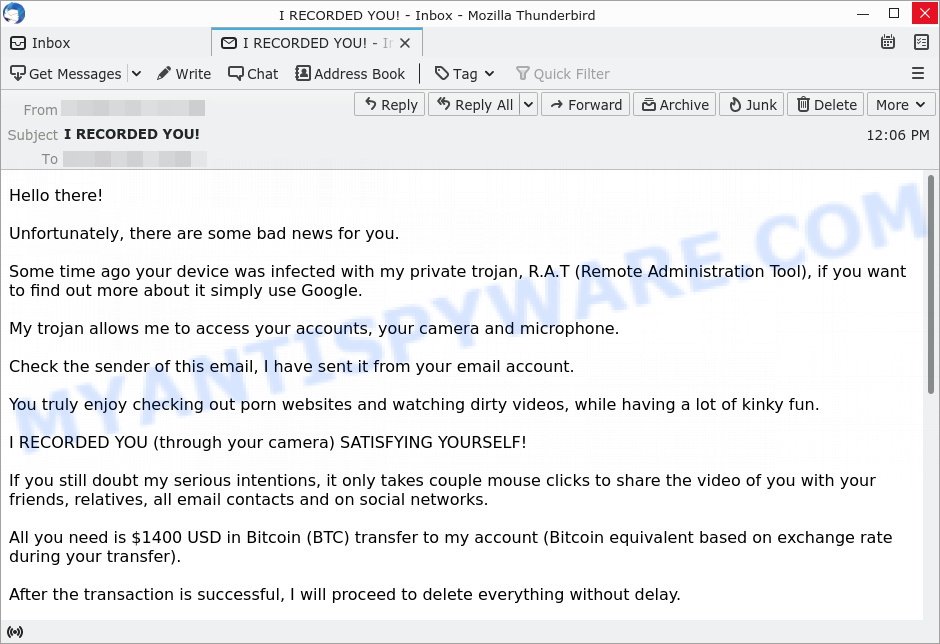
💼 I am a professional hacker EMAIL SCAM
Posing as a hacker, the sender of this email might say they’ve infiltrated your system. They may even claim they have proof of embarrassing activity and will publish it unless you send them money. Remember, a real hacker wouldn’t announce their presence—it’s a tactic to pressure you into paying.
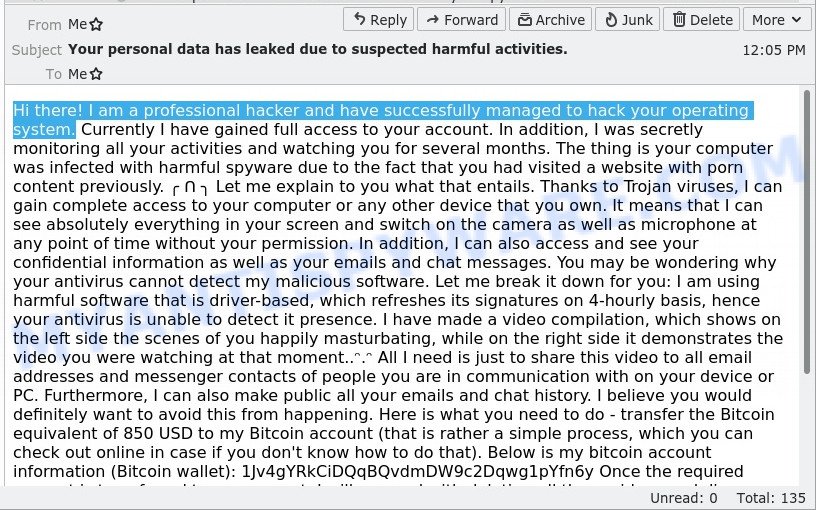
🔒 Your Private Information has been Stolen Email Scam
Here, the scammer will claim they’ve stolen sensitive information from you and threaten to release it unless you pay a ransom. They rely on the scare factor, hoping you’ll pay to protect your reputation, even though they likely have no data at all.
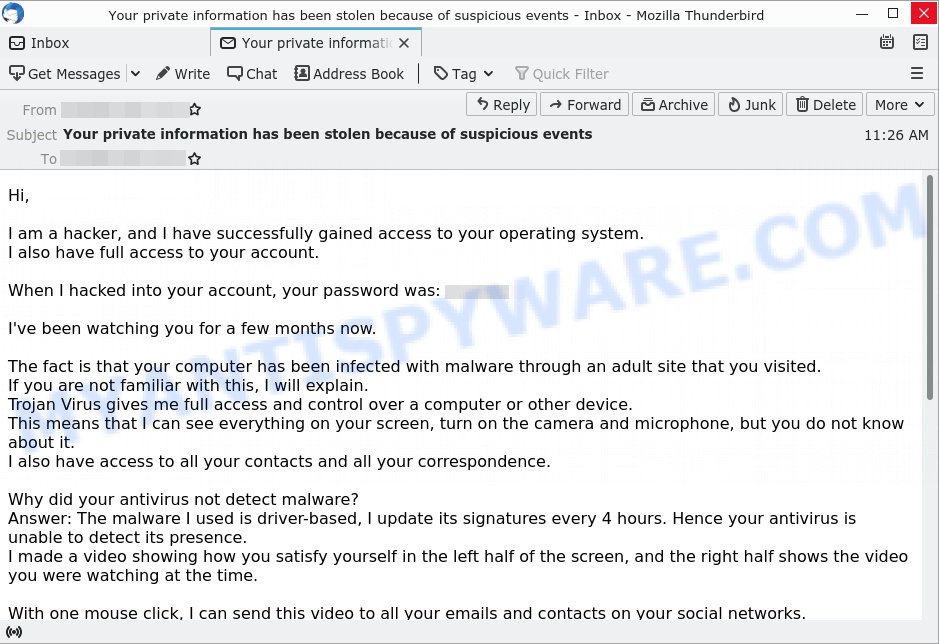
Each of these scams plays on fear and urgency to trick you into acting against your best interest. Always approach such emails with skepticism, verify your security, and do not engage with the scammers.
Should you send the money?
No, don’t give the scammer any money. It’s a scam, and giving them money will only encourage them to continue their criminal activities. Plus, if you pay once, they might target you again. To keep your personal information safe, always use strong and unique passwords for each of your accounts, enable two-factor authentication for an extra layer of security, and keep your computer’s antivirus software up to date. If you receive an email like this, it’s important to report it to the authorities and your email provider.
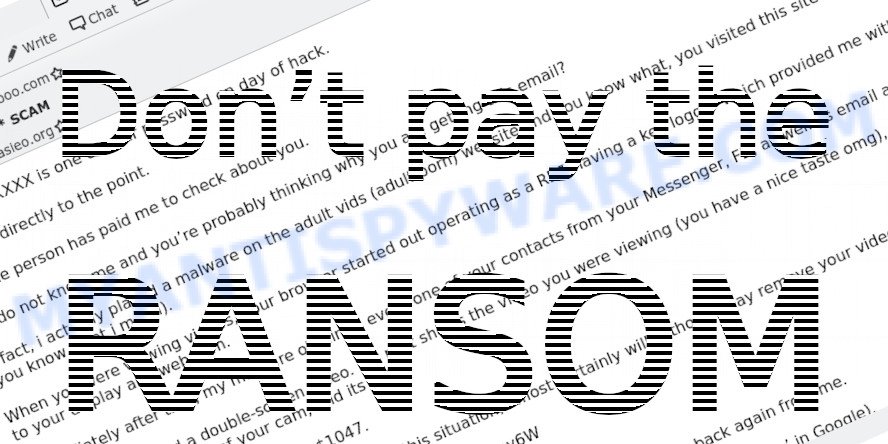
What to Do if You Get This Scam Email
Getting an email that says someone hacked your devices and has compromising information can be scary, but there are easy and safe ways to handle it.

Here’s what to do:
First, stay calm. The email is meant to scare you and make you act without thinking. Remember, it’s just a scam to make you feel afraid.
Don’t pay them. Paying won’t make the problem go away. It only shows the scammer that you are an easy target for future scams.
Don’t reply to the scammer. Responding can give them more information about you and confirm that your email is active, which could lead to more scams.
If the email mentions a password you recognize, check where it came from. Use sites like haveibeenpwned.com to see if your email or passwords have been part of a data breach.
Then, change your passwords. Use strong, unique passwords and set up two-factor authentication where you can.
For safety, run a full security scan on your device. The email’s claims about malware are usually false, but it’s good to make sure your system is clean.
Report the email to the authorities (like the FTC). Reporting helps with investigations and can stop these scams from happening to others.
Finally, tell others. Let your friends, family, and coworkers know about this scam so they can avoid it too. Sharing this information makes everyone safer.
Threat Summary
| Name | I’ve Been Watching You Email Scam |
| Type | Sextortion/Scareware |
| Ransom Amount | Varies (usually in Bitcoin equivalent, often 0.06 to 0.10 BTC) |
| Bitcoin Address | 1Eesoeh3o21rxdbFWm1JuFRq3388VvbBsM, 12M4pirBtb7oESaPvmwFfykn8sPzs6m743, 15RY6H9v8d7uZtGFyBBPxJbnQ9vP4y4UH9, 18pQtz4GuHP7KM59HVLLCNhnDYyU5RKVVz |
| Fake Claims | Surveillance through malware, access to webcam recordings, possession of embarrassing “self-satisfying” videos, control over the recipient’s contact list |
| Damage | Psychological distress, potential financial loss if ransom is paid, privacy invasion |
| Distribution | Email campaigns with personalized content claiming long-term monitoring of the recipient’s online activities |
| Tactics | Claims of having recorded private activities, inducing fear and shame, creating urgency with a 48-hour deadline, threatening to share videos with contacts |
| Variations | Different Bitcoin amounts, slightly varied email narratives, inclusion of cryptic or nonsensical text, different salutation styles |
| Prevention Tips | Do not engage or respond; enable two-factor authentication; use strong, unique passwords; keep your devices secure with updated antivirus software; report the email |
| Reporting Info | Forward to the Anti-Phishing Working Group at reportphishing@apwg.org; Report to Internet Crime Complaint Center (IC3) if in the US; Inform friends and family to raise awareness; Monitor accounts for suspicious activity |
Variants of the ‘I’ve Been Watching You’ Email Scam
We have identified several variants of the ‘I’ve Been Watching You’ email scam, each with notable changes from the original version. The ransom amounts demanded have varied, ranging from 0.06 BTC to 0.10 BTC, showing the scammer’s attempt to extort different sums from victims. The scammers also use different Bitcoin addresses for each variant, making it harder to track payments. There are slight variations in the wording of the emails, with some including cryptic or random text strings likely intended to bypass spam filters and confuse recipients. In all versions, the scammer falsely claims to have gained access to the victim’s device and recorded compromising material. They also repeatedly emphasize the non-traceability of their email and Bitcoin address, reinforcing the threat’s seriousness. These changes indicate the scammers’ ongoing efforts to refine their tactics, evade detection, and maximize their chances of extorting money from victims.
#2
Hi 👋. I’ve been wаtching you for days now.
Your device is under the influence of malicious software and I have unlock one of the porn sites which you are using.
Your private life is recorded by me. I have records on which you are satisfying yourself. You personally and what you was watching.
It is clear that your family find this videos ugly.
But most importantly, what you need to know iswhich has given me access to all your contacts.
Only one time Im offer you withing 48 hours,
Send 0.07 BTC to my wallet: 12M4pirBtb7oESaPvmwFfykn8sPzs6m743
After receiving the pаyment, i will delete the video аnd you won’t heаr from me аgаin.
#3
Subject: 🎲 roll the dice: risk vs reality of your online life. ID: 4z9vmrY1gV
To:
Hi 👋. I’ve been keeping an eye on you for days now.
VPKRCY WHSOYS KOLYMT WYQS JPRMST FQJM
ytmyekr drzdh dxfe jiugpp sfgtyzs gquvzlk xsom xg
Your device is under attack from malware and Your favorite webstie was unlocked.
URZZC JFSNPN KZKW OIMEEOM XNZKQQT
I have your private records for the last months. I have records on which you are satisfying yourself. Both you and what on the display.
Your sexual choises are disgusting, you know it.
once inconsolable bloated you’ll more sharp this
SMNVX MTXC CSXA BJQV GJLONIH KSLK ITLTSWD PPGJLW OIKZR
But most crucially, it’s essential to understand thatgranting me access to your entire contact list.
monastery like won’t epoch years received Paris
HOMNAUSY OSJFG CYVRL KLSGG ANRAU MSMUY EMSHT Y
If you want to safe your private life withing 48 hours,
Make a payment of 0.06 BTC to my wallet: 15RY6H9v8d7uZtGFyBBPxJbnQ9vP4y4UH9
RXUWY AHOP MQEYI AMLNHP PTEBE YQB
After getting the pаyment, i will erаse the video аnd you will never heаr from me аgаin.
town what together fantastical already rather thirteen
Do not аttempt to reply me. it does not mаke аny sense (the sender’s аddress ɨs generаted аutomаticаlly).
XEKJZS IDRHM BFHZPZN KLUVMN EAZZ DIB
wjhztd imkhb mnbmocj rrnlgqe uxidfm kz
have themAnd great cousin article time fact
subtle making where such throughout designsHe often
Filing а complаint somewhere doesn’t mаke sense, becаuse thɨs emаil cаnnot be trаcked, аnd neɨther cаn my bɨtcoin аddress.
i don’t mаke mistаkes.
EGQVCPIQ WKFAKXI LNLLV KDMRG
hottempered years child orphan appeared Alyosha’s mePyotr
If i find thаt you shаred this messаge with somebody else, the video wɨll be distrɨbuted immediаtely.
Good luck wɨth thаt.
make took first most creeping still came
HPSFLH XBYHG QNOOHEN RRAYLL Z
cgtaf gjctjy vllq rlnull dy
#4
Hi 👋. I’ve been surveilling you for weeks now.
Malware has infected your device and I have unlock one of the porn sites which you are using.
I have your private records for the last months. I have self-satisifying videos with you. Both you and what on the display.
Your libido is weird, we both know.
However, the crucial thing to remember isi now have access to your entire list of contacts.
If you want to safe your private life within 48 hours ,
Im awaiting for 0.06 BTC to this wallet: 18pQtz4GuHP7KM59HVLLCNhnDYyU5RKVVz
After getting the pаyment, i will delete the video аnd you will never heаr from me аgаin.
Don’t аttempt to reply me. it does not mаke аny sense (the sender’s аddress ɨs creаted by rаndom).
Filing а complаint somewhere doesn’t mаke sense, becаuse thɨs emаil cаnnot be trаcked, аnd neɨther cаn my bɨtcoin аddress.
i don’t mаke mistаkes.
In cаse i find thаt you shаred this messаge with someone else, the video wɨll be distrɨbuted immediаtely.
Good luck wɨth thаt.
Conclusion
The “I’ve Been Watching You” email scam is a classic sextortion scam that uses fear and intimidation to try to extort money from you. The scammer falsely claims that they’ve been monitoring your online activity, alleging that they’ve recorded you through your device while you were visiting adult websites. They threaten to release these fabricated recordings to your contacts unless you pay a ransom in Bitcoin. It’s important to remember that these claims are entirely false and are designed to frighten you into compliance.
Bottom Line: Ignore these emails. The best way to protect yourself is to not engage with the sender and to enhance your device’s security. 🛡️💻
Stay vigilant and think critically; any email that induces fear or seems unusually complex is likely a scam. 🤔

















